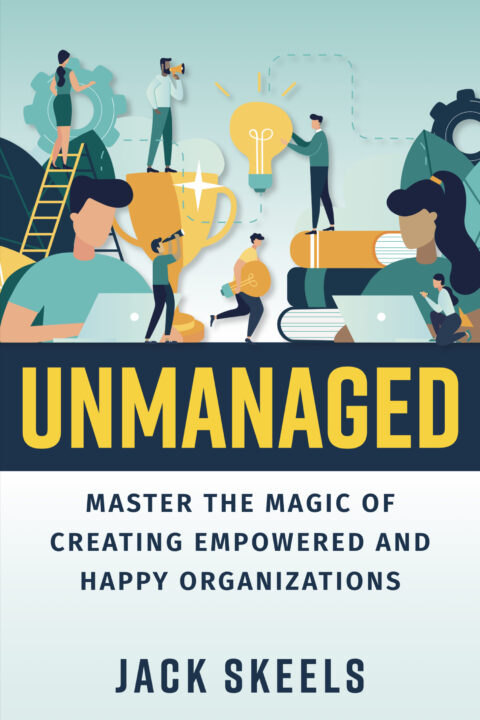Put UNMANAGED Into Action
Bring the magic you’ve read about in UNMANAGED to your career or organization
What next, you may be wondering?
As you can tell from the book, it is a journey that takes some serious work. As even our most gifted client will attest, it requires a shift in many hearts and minds, including your own. The good news is that you’re already on your way.
Below are some of the many programs we have to get you or your organization started towards a better way of managing and all of its benefits. Our individual and manager/leader programs are designed to build basic skills in individuals that will enable a better managerial posture in-action. They are not intended for, nor generally will they enable you to succeed at, organizational change. This latter point is true for all but the most limited version of department or small group changes; most of today’s organizations have so many “multi-multi-” conmplexities to them that a more-holistic and systemic approach is required, which is what our organizational transformation curriculum is designed for.

INTRODUCTION AND ORIGINS
What next, you may be wondering?
As you can tell from the book, it is a journey that takes some serious work. As even our most gifted client will attest, it requires a shift in many hearts and minds, including your own. The good news is that you’re already on your way.
Here are the various programs we have to get you or your organization started towards a better way of managing and all of its benefits.
Individuals as managers and leaders:
- Leader and manager development coaching. We offer structured individual coaching to leaders and managers, both for the “mentored” application of the UNMANAGED methods, but also for key challenges and growth opportunities in one’s career path and workplace. You can find more information here, on AgencyAgile, at Leadership and Managerial Coaching.
- Expowering Management Program (EMP): We offer group coaching mentoring based on the “UNMANAGED” book content, covering the core topics within the book (Why, What, Go, Grow) plus the development of “Ingenious Manager” (Section 6) skills of Presence, Managing the Reactive Pathway, and the use of Questions. This program uses a small learning group (SLG) model of 4-10 participants meeting for multiple 90-minute sessions. If you have more than 10 managers or leaders, we would form multiple SLGs. You can learn more here, on AgencyAgile.com, at Empowered Management Program, (EMP).
BTW, if you have enjoyed the book, please do leave a review on Amazon!
Thanks for being part of making better workplaces.
Jack Skeels
(ALSO: Please accept my apology as I am still cleaning up the “Notes” page. Lots of moving pieces in writing a book, and I feel bad that I didn’t get this cleaned up sooner.)
End Notes & Resources
- The working title of that book was How to Run a F**king Agency, by the Guy Whom You Said Could Not Run an Agency. Clearly, I was not unhinged at all.
- Mintzberg, Henry; Managers, not MBAs: a hard look at the soft practice of managing and management development, 2004, Berrett-Koehler Publishers in English – 1st ed.
- The name of our company is a bit of a misnomer as we don’t “do” agile really; nor do we only work with agencies. It sounded catchy, and the domain was available. I tell myself that while there are better names, there are also worse ones.
- The Why Moment also embodies many of the great differences between Japanese and Western management styles and is called Ba, which (roughly) means “a shared place.” Ikujiro Nonaka, “A Dynamic Theory of Organizational Knowledge Creation,” Organization Science 5, no. 1 (February 1994).
- The name agency really means an organization in service of many clients, which is a situation many departments and teams in non-agencies find themselves in these days as organizational silos are broken down by the rapid demands of business.
- A more detailed rationale and many insightful ideas can be found in the microeconomic field of “Agency Theory” where buyer-seller relationships are deconstructed into what is known as the “principal-agent problem”, an asymmetric form of relationship where the highly-specialized seller (agent) often has one or more advantages over the buyer.
- My writings on Agile are mostly on Medium.com (https://medium.com/@jackskeels) but you can also find a more full selection on this book’s online resources page: https://unmanagedbook.com/resources (Here is a selection of my writings, including some client cases, and articles published in trade press)
- https://jackskeels.medium.com/the-elusive-search-for-organizational-agile-ed33af41fb02
- https://jackskeels.medium.com/how-marketing-is-destroying-agile-a53933080ba4
- https://jackskeels.medium.com/will-management-succeed-at-killing-agile-7126e8d16843
- https://medium.com/swlh/why-you-should-probably-never-say-agile-df001a5bc22c
- https://jackskeels.medium.com/calming-agency-chaos-by-un-managing-307f50b9f48d
- https://agencyagile.com/a-better-agile-for-agencies-at-helloworld/
- https://agencyagile.com/why-its-hard-to-make-agile-work/
- https://agencyagile.com/why-we-threw-our-hierarchical-org-chart-down-the-waterfall/
- https://agencyagile.com/ming-chan-in-forbes-benefits-of-using-agile-in-an-agency/
- Also, I would refer you to the lone Agile book on our AgencyAgile bookshelf, by Larman and Vodde. https://agencyagile.com/bookshelf/
